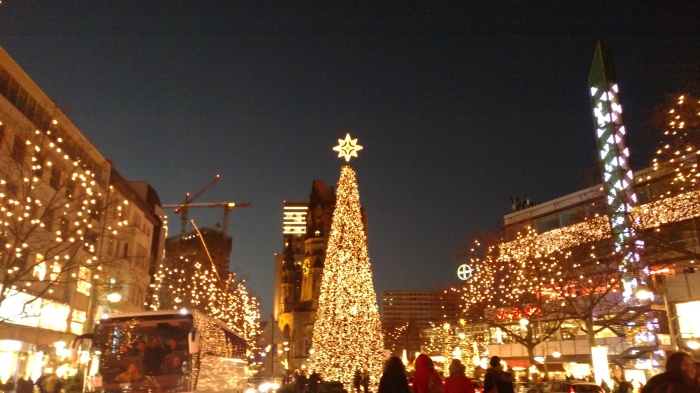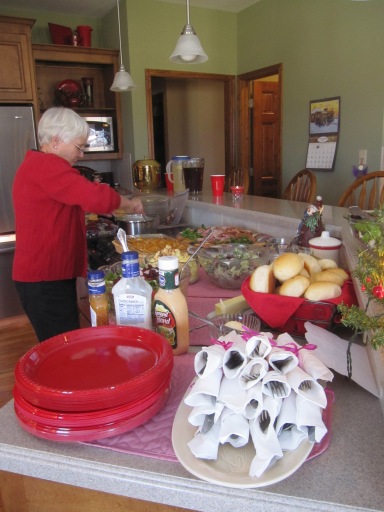
Hollywood lies.
I’m not talking about Disney princesses and Prince Charmings. My frustration is at an even more basic level of expectation versus reality. You see, according to Hollywood, bad things happen in dark and empty alleyways. And according to Hollywood, sad scenes almost exclusively take place in the rain. But if the music is in major key and the setting is bright and cheery, then, according to Hollywood, the scene should be happy. And so it follows that, according to Hollywood, German Christmas markets should be among the happiest and safest places on earth.
But the events of Monday night in Berlin laughed in the face of this cinematic logic. Because while people were chatting, shopping, and enjoying life, the unthinkable happened. Evil—heartless, senseless, and unspeakable evil—revved the engine, jumped the curb, and left death and carnage in its wake.
Two days later, my heart is aching and my insides still feel numb. Because not only am I upset by the blatant cruelty of this tragedy–I mean, how could someone attack a Christmas market?–but this hits unbelievably close to home. You see, I lived in Berlin on and off for almost a year, and in the process, this city became like home. I care deeply about the people there, and the fact that someone would murder them is nauseating. And that they would hijack the truck of a delivery man from Poland–another country I have come to love–is as infuriating as it is heartbreaking.
But I’m also upset on another, perhaps more jarring level: last year, I stood in that very Christmas market with my best friend, chatting, shopping, and enjoying life. After a late lunch at the KaDeWe, we headed down to this market, where we sipped Gluehwein, bought souvenirs, and marveled at the colorful stars for sale. Out of all the Christmas markets I frequented last winter, the one at Breitscheidplatz was by far my favorite. With its massive Christmas tree next to the glowing-blue stained glass Gedaechtniskirche, this market felt particularly magical. That this very same place became the site of such senseless violence and that the people who died there were just like me is a lot to take in. If my research year had fallen just a little later, I could have been there on Monday night with them. One of those 12 dead or 48 injured could have been me.
These are heavy thoughts, I know, and they have been weighing on me since I got the news on Monday afternoon. Now as I sit at home in Kansas, surrounded by all the trappings and trimmings of Christmas, I can’t help but feel the disconnect. Between the sorrow I feel on the inside and the joy I’m supposed to exude on the outside. Between the happiness that Hollywood tells me should accompany this season and the suffering that is happening around the world. Between the darkness sitting heavily upon me and the light I so badly want to believe that Jesus came to bring.
All Advent season and well before Monday happened, I have been wrestling with these thoughts. The Hollywood version of Christmas claims to be “merry and bright” and a season of endless joy. But this year, Christmas seems anything but happy. The civil war in Syria shows no signs of ending, and the remaining citizens in Aleppo are facing almost certain death. The families of terror victims across France and Belgium, as well as those who lost loved ones in the racial violence in the U.S. this summer, are still mourning. And then there are the countless families who still grieve those lost in more “normal” but no less tragic ways, such as cancer, car accidents, and suicide.
Taken together, there is a lot of darkness and sorrow in this world of ours. And during these last few weeks of Advent, I have felt the weight of it, perhaps more acutely than ever before. How are we supposed to be filled with “Christmas cheer” when so much of the world appears to be falling apart? Where is that joy that I’m supposed to be experiencing? I find myself resonating with that old Christmas hymn,
And in despair I bowed my head;
“There is no peace on earth,” I said;
“For hate is strong,
And mocks the song
Of peace on earth, good-will to men!”
Aleppo, Berlin, and countless individual sorrows seem to mock the idea of Christmas. But then again, isn’t that the whole point of Christmas? That into the darkest places of pain and the most broken parts of humanity, God comes to us.
Even as I write this, I know that answer feels Sunday-schooly, perhaps even a bit trite. Especially if you’ve grown up in the church, it’s easy to say things like “God came to us” without thinking about what that means. But these last few weeks, and especially these last few days, have turned such Christianese-esque indifference into a luxury I can’t afford. I am hurting, and I want answers. And even more than answers, I need to know–deep down in the painful places–that God has come and that He cares. That’s my prayer as this Advent season draws to a close, that His light would shine into this darkness of our world and this darkness that I feel, and that I would remember again the rest of that old song:
Then pealed the bells more loud and deep:
“God is not dead, nor doth He sleep;
The Wrong shall fail,
The Right prevail,
With peace on earth, good-will to men.”
Amen. Come, Lord Jesus. Please.









